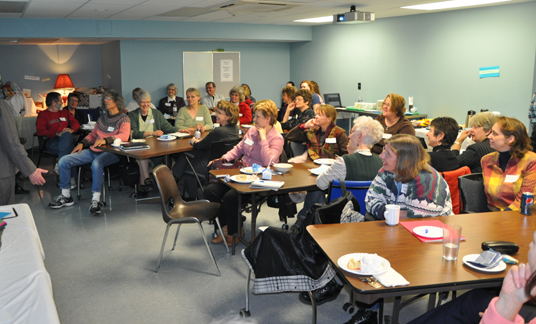CHRISTINE HUDDER
Staff Reporter
BARRY’S BAY – There certainly is no shortage of caring souls in the area. It was evident on February 28, when dozens of men and women attended a Madawaska Valley Hospice volunteer seminar at St. Francis Memorial Hospital.
For more than a year now, plans have been underway for a hospice in Barry’s Bay that would serve the needs of terminally ill and dying patients.
Before that comes to fruition, however, the hospice committee wants to secure the help from volunteers to make the process a reality. Volunteers are not only required for the hospice, but for palliative care patients living in their homes across the Valley.
Karen Wagner is the Madawaska Valley Hospice Facilitator. She hopes that more people sign up to volunteer with the hospice.
“We don’t really know how many we are going to need,” she admitted. “So it really varies, but the more the better.”
She noted that Bancroft’s hospice has 80 people signed up to volunteer.
Around 35 potential volunteers showed up for the Feb. 28 information night. They hailed from communities like Quadeville, Palmer Rapids, Combermere, Barry’s Bay, Wilno, Killaloe and Madawaska.
They were presented with a hospice video, made by the students at Madawaska Valley District High School, followed by a power point presentation on what is required of a volunteer.
Wagner led the discussion and explained there are many different opportunities for volunteering in a hospice environment, ranging from transportation to office assistance.
“The primary one that we need is direct patient contact person, who wants to sit and help out directly with the patient and the family,” Wagner told the Gazette.
She explained that it is one of the most challenging positions.
“And most rewarding,” she added.
Alternatively, helpers can do dishes, make meals, and drive family members to and from the hospice. Compensation for mileage will be provided.
“We have a lady here, just recently, that was spending $40 a day on taxis, coming to visit her husband who was in the hospital,” Wagner explained.
In order to prepare for the volunteer role, Wagner said those interested must take part in a free 36 hour training course. This ensures volunteers know their responsibilities when helping out. Wagner said the training will be done at times suitable to the volunteers.
“The volunteers have a very unique relationship,” Wagner said. “They go in and they can be a confidant. They can be just a friend to hold a hand to give that support. There are so many different things that the volunteers can do. The family and the patient develop quite a relationship with that volunteer because it’s like a peer. It’s not somebody they are asking for advice. They go to the doctor or the medical people for that. They often tell volunteers things they won’t tell their doctor. It’s a very special, unique relationship.”
Bev Swrjeski is also on the hospice committee. She said she would like to find a
diverse crowd of volunteers to fill the different roles.
“That’s what I want to find out about you over the course of this program is what your unique gifts are to the people who are ill,” she said to the crowd.
She said volunteers will be asked to do a variety of tasks, from hiding Easter eggs for the patient’s grandchildren to wrapping Christmas presents for relatives.
“We have been given an incredible gift. That gift is to be with them when they are not at their best,” Swrjeski explained. “You go to your client full of life. That’s what they are looking for, they are looking for as much life as they can get.”
Wagner said a hospice/palliative care volunteer never replaces a professional role, but compliments the existing palliative care team.
Story continues in the March 8, Issue of The Valley Gazette.
